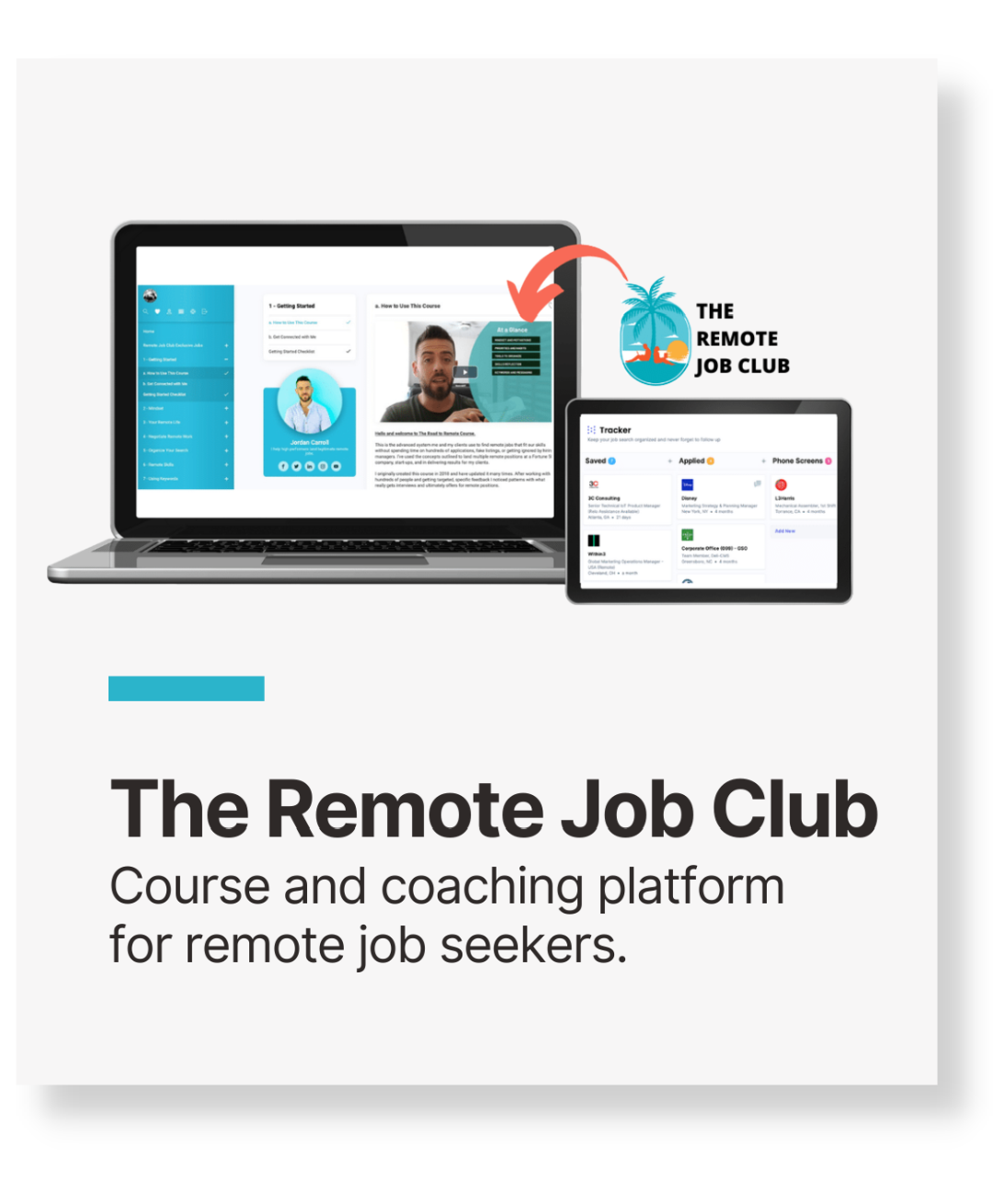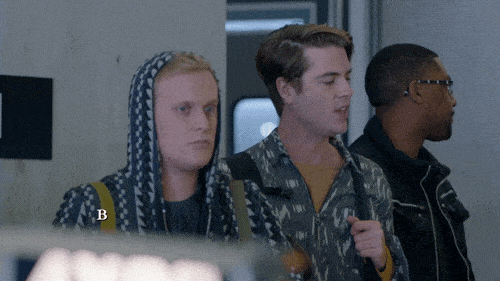13 MISTAKES That KILL a Zoom Interview (Stop Doing These!)
If you haven’t yet grabbed your free copy of my Interview Preparation Package, you can get it here.
Interview Research Prep Template to help you know how to research both companies and interviewers.
17 Thought-Provoking Interview Questions you can use immediately to wow interviewers.
Step-by-Step Guides so you know exactly what to research and what tools to use to ace your interview.
About to hop on a zoom interview for your dream job? Not so fast!
Before you interview, let’s go over 13 deadly zoom interview mistakes that you cannot afford to overlook.
I talk to job seekers every single week who don’t even realize that they are sabotaging themselves by making these mistakes:
Being Unprepared
Muffled Audio
Blurry or Dark Video
Distracting Environment
Low Energy
Not Creating Personal Connection
Neglecting the Job Description
Focusing on Questions Instead of Stories
Rambling On and On
Saying Answers for the First Time
Overemphasizing Your Desire to Be Remote
Not Asking Great Questions
Forgetting to Follow Up
I’m going to show you exactly how to fix these mistakes, and of course, give you some some amazing free resources you can use immediatley.
Read on and you’ll see at least one mistake that you had no idea you were doing, guaranteed.
Mistake 1: Being Unprepared
Going into a job interview without doing your research is like going on a date without taking a shower.
No matter how informal you think a zoom interview will be, it always pays to be overprepared.
That’s because companies are constantly trying to figure out what’s WRONG with you. You are a risk, and their goal, especially in the early stages — is to disqualify you.
That means that YOUR JOB throughout the interview is to prepare yourself so that you can gain their trust during the hiring process.
When doing company research, focus on doing 3 separate things:
The company
The role
The interviewer(s)
1. Research The COMPANY
With the company, it should be your aim to look at how your background aligns with their culture, mission, and values:
Sign up for their newsletters
Read their website
Follow their social media accounts
Use their product (if you can)
Use Glassdoor to get insights on their latest initiatives and even their interview processes
Integrating yourself into a company’s ecosystem really helps you understand how the company sees itself and present itself to the outside world.
2. Research the Role
Look into the job description of your desired role:
Get a sense of what team you’d be working on
Learn what your responsibilities will be
Think of exact achievements and metrics from past roles that would apply to these requirements
Understanding the expectations of the role and how your experience matches up will enable you to make a strong pitch for your candidacy.
3. Research The Interviewer(s)
Start by figuring out who will interview and then learn about them. Find them on LinkedIn and search them on Google.
Please don’t stalk them, for everyone’s sake. Rather, your goal is to get to a sense of them as a person and professional.
What is this person’s job role and responsibilities in the company?
What about their career is interesting?
Do you have any mutual connections, interests, clubs, or communities?
Look at their post history and activity feed on LinkedIn. What do they post, comment on, or like? What does that say about them?
For more company & interviewer research tips + 17 Thought-Provoking Interview Questions, snag a free copy of my Interview Research Prep Template.
Mistake 2: hAVING Muffled Audio
As you can imagine, how well people can hear you matters tremendously when you’re working remotely. Despite this, many people don’t consider how they sound.
You could sound like you’re talking underwater and not know it, because most people will just suffer in silence through your inaudibility because of their fear of being rude by calling you out.
A few considerations to help you sound your best:
Record a Zoom call with a friend and replay the video. Get a sense of what it’s like to be on the receiving end of how you sound.
Invest in an audio solution that’s not your computer’s internal mic. They tend to pick up all the little background noises.
Better audio equipment doesn’t have to be an expensive investment. You can buy a very affordable, simple USB microphone, or even wired headphones with an attached mic work well. All that matters is finding an audio setup that sounds good, no need to overcomplicate it.
Here is a link to the microphone I use and recommend, the Blue Yeti Snowball Mic.
Now we’ve covered how you sound, but how do you look?
Mistake 3: Blurry or Dark Video
While having crisp audio is substantially more important than what your video looks like, having good picture quality is still valuable because video calls are so prevalent.
You’re sending subconscious messages to recruiters, hiring managers, and potential coworkers during an interview. This is like a preview of working with you. Think about the impression it makes when someone shows up to a Zoom call that looks like it’s being shot inside of a potato.
Here are some Zoom interview tips that will make you look like a billion bucks on camera:
At minimum, make sure you have light coming from behind the camera to your face so you’re not casting a shadow.
Keep your eyes level with the camera so people aren’t looking up your nose.
Curate your background so that it’s not distracting for the interviewer, and remove any controversial or polarizing objects in the background that can either start an unwanted conversation or be off-putting. (For example: no political signs, drug paraphernalia, or religious symbols)
PRO TIP: If you did research on the interviewer and found a mutual interest, you can strategically place items in your background that speak to that interest.
For example, If both you and the interviewer snowboards, having a snow board or picture of a mountain in your background might help you build a connection.
To wrap this up - it’s not the end of the world to use your computer’s built-in camera, but make sure you can be seen and heard clearly.
For video tech recommendations and other more, check out my Remote Essentials.
Mistake 4: Distracting Environment
I don’t have any kids that I’m aware of, but if I did I’d lock them up in their kennels during a Zoom interview.
While I’m half-joking, minimizing distractions is no joking matter — because there’s no excuse for not giving your full attention to an interview.
Here’s a checklist for creating a distraction-free environment for your Zoom interview:
Keep your devices off or put them in another room on silent mode
Close all tabs on your computer other than your notes
Put the dog in the furthest room away from you
Do the best you can to pick the most quiet space you have available to you and communicate with family members or anyone you live with that this is an important time for silence
PRO TIP: One distraction you want to avoid at all costs is bad Internet connectivity
Always hardwire your connection with an ethernet cord because it can reduce the latency and increase the connection speed without changing anything with your internet provider
Don’t risk the chance of other activities or people drawing your attention away during this crucial part of the hiring process.
Mistake 5: Low Energy
Some people say the camera adds ten pounds, well I think the camera also removes ten pounds of energy. That’s why I recommend you move and boost your energy immediately before a Zoom interview. Changing your physiology directly influences your emotional state, so when you move the energy around you can shift nerves and feelings of anxiety to excitement.
Five to ten minutes before you jump on the call, try the following energy-boosting activities:
Do a dance, pushups, jumping jacks, or some kind of bodily movement that will get the blood flowing
After you move, take a few slow, deep breaths in and out
Do a breathing exercise called “Breath of Fire” which focuses on a forceful exhale
Make sure to focus on smiling
It can feel strange to overly force a smile but it literally changes how you sound and feel. Find a balance of letting your natural excitement allow you to ease into a confident smile while you're talking to them.
This will also help your anxiety if you're nervous, but just remember to keep breathing.
Mistake 6: Not Creating Personal Connection
I’m not saying you need to be best friends with your interviewer.
However, the better you get at relating to people and leaving them with an enjoyable experience, the more likely you’ll get hired. Remember, a big part of the zoom interview is doing your research on the person. After you’ve done that, you should have some ammunition to fire out some friend bullets their way.
Here are a few high-level tips for connecting with your interviewer on a personal level:
Feel them out at the beginning. If they’re open to having some small talk, take the opportunity to be likable.
If they ask you how you’re doing - don’t just say “GOOD.” Have an answer prepared to go a little deeper, especially if you know they have a specific mutual interest that you can bring up.
One of my favorite ways to also build likability, and show you’ve done your research, is to add your interviewer's experience into your answers whenever possible.
Maybe you're switching industries and you know from your research that your interviewer also switched industries to join the company. If your interviewer asks “how you think you'll be able to transfer your skills,” you can explain how you think it will work for you, then ask something like, “I noticed you also switched industries to land where you did with [company name]. What do you think are the reasons you've been so successful?" Once they've given you their answer, now you can add to your own response because the reasons they were successful might also apply to you.
People hire people they like and actually want to be around. If all things are equal between you and another candidate, but the team just likes you more, you’ll be the person who gets the job.
Mistake 7: Neglecting the Job Description
Having a job description for a Zoom interview is like having an open-book test. You might not know the exact questions your interviewer will ask, but you do know what the company is looking for. It’s right there in the language they use in their job description.
But most job seekers don’t even think to bring the job description back into the conversation during the interview.
“How do you bring up the job description in a video interview?” You might be asking:
Take keywords and phrases from the job description and sprinkle them throughout the stories you tell. You can use these keywords as anchors for your responses.
When you’re preparing for an interview, attach a story to each keyword or phrase from the job description that resonates with you. Then when you use a certain keyword, it will be a cue to also bring up a particular story.
You can even directly bring up the job description in responses:
Say something like “I was looking through the job description and it said [insert responsibility or requirement here] which directly relates to an experience I’ve had doing [same responsibility and requirement] which has prepared me to step into this role and make an impact immediately.”
Don’t feel like you have to recreate the wheel every time. Use what they give you as a literal cheat sheet for your answers and how you articulate yourself.
Mistake 8: Focusing on Questions Instead of Stories
Mistake number 8 is spending way too much time on interview questions instead of your own professional stories.
People often approach a job interview like a test in school. They think if they can get a copy of the test, they can get an A by memorizing all the questions and answers.
It doesn’t work that way in an interview. It’s impossible to memorize all the potential questions you’ll be asked. Yes, some interview questions come up regularly, but you can never know for certain what will happen.
You want to be able to adapt when an interviewer throws a curveball you didn’t expect. Memorized answers come across as stiff and leave little room for you to be able to do that.
That’s why I recommend focusing on stories instead of just questions.
Humans love stories. For you, it will be easier to remember a story rather than a specific answer to every possible question.
Interviewers will be able to understand you better when you format your answers as stories.
By becoming a master of your stories you can use them for any number of questions and become flexible enough to handle whatever comes your way. So it also becomes less work for you overall.
Instead of memorizing dozens of questions, focus on a handful of impactful stories that substantiate your skills. Connect your stories to the keywords and phrases in the job description. Then you can adjust each of them to meet the needs of each question as they come up.
Mistake 9: Rambling On and On
The issue with stories is people make them way too long, which brings us to the mistake of rambling on and on.
If you’ve ever been on the receiving end of a “long story short” that seems to keep getting longer, you know it’s easy to tune people out.
Here are some structural tips to keep your stories punchy and riveting:
To avoid being tuned out by an interviewer, make your stories concise and start them like a movie preview in the theater. Give your audience everything they need to know about your story in a compact way that piques their attention.
[Movie Preview] - Concise, Context, Most Important Thing to Listen For
Lay out the steps of your story and the actions you took. By breaking it into steps, you help yourself stay on track as well as help the listener know where you’re at in the story.
[Steps of the Story] - Action You Took, Broken Down into Steps You Can Follow
Then drop the wisdom, what you learned and the results you got, at the end of your story.
[Wisdom Drop] - Results and What You Learned, Why it Applies to Them
Studies now show that the average human attention span is now shorter than a goldfish so keep your answers short. The best way to do that is to actually practice.
Mistake 10: Saying it for the first time
Practice your stories. Don’t wait until your Zoom interview to say your stories or answers aloud for the first time.
Sure, there will be times when you are going to improvise and you’ll remember a random yet relevant story to bring up during an interview that you hadn’t practiced.
But that shouldn’t be the norm.
If you practice and prepare the right way, you’ll have considered all the different stories you can bring up during an interview and practiced them out loud many times so that they can come across as natural and easy.
Here is how you can practice your stories:
Find someone to do interview practice with. Just having another warm body that you’re forced to express yourself to will help you clean up a lot of errors and improve your confidence.
It can just be a friend, but even better if you can find a coach or expert (like me) who can give you real and precise feedback.
If you don’t have anyone to practice with, you can also record yourself and rewatch the video.
Yes, it will be cringe. Yes, it will probably hurt your eyes. No, you won’t go blind. Power through the awkwardness and understand it’s much better for just you to see how awkward you are than for it to happen during an interview.
Mistake 11: Overemphasizing Your Desire to Be Remote
Being the Remote Job Coach, I run into a lot of job seekers who’s entire job search strategy is to talk about how much they need a remote job By overemphasizing their desire to be remote, they cloud their true alignment to the company and end up coming across as desperate.
When you’re desperate to just be remote, that compromises how much you care about the company or the job itself. This attitude will show up in the way you communicate.
It’s like dating someone and telling them the only reason you’re dating them is because they’re hot. It’s like yeah, they like being hot, but they also like when people also recognize that they have a personality too.
My recommendation is to focus more on why you're competent for the role itself without putting the idea of being remote on a pedestal.
Here’s the thing though — Remote work might be a topic of discussion during the interview.
If remote work comes up in a video interview, highlight the following:
Your remote skills
Any experience that you have working remotely
Tools you’ve used for remote collaboration
Communicating about remote work in this way will convey value, not desperation, and increase your standing as a job candidate.
Mistake 12: Not Asking Questions
Too many job seekers are not asking any great questions.
By not asking questions, they are giving up their leverage and acting as if the company is only evaluating them, completely ignoring the fact that a job interview is actually a mutual qualification on both sides.
When preparing questions for a zoom interview, keep these tips in mind:
You’re also determining if a company and job is right for you. You need to have some thought-provoking questions ready to go.
Don’t ask anything that’s easily found online. If you can google the answer, don’t ask it.
Instead, download my 17 Thought-Provoking Zoom Interview Questions to help guide you in thinking up some amazing questions for your interviewer.
Mistake 13: Forgetting the Follow Up
Last one my friends, don’t forget the follow-up.
You MUST follow up with an interviewer after your zoom interview.
To prepare for your follow-up, I recommend taking notes in an email template while you’re on the interview. This way, you’ll be mostly ready to follow up by the time your interview is over.
Do this in your follow-up email:
Include appreciation for your interviewer’s time
Summarize a few things that you learned from the conversation
Add any response to a potential objection that happened during the interview
Recap why you think you’re a good fit and any next steps that were agreed upon
Send your follow-up email on the same day as the interview. Send out an email to each person individually if there were multiple interviewers.
There is no reason to wait, this isn’t your high school crush who you have to pretend not to care about to get attention from.
Conclusion
You’ve now been schooled on 13 mistakes you must not make during a Zoom interview! If you enjoyed the article or if it provided you even an ounce of value, please share it with someone else who needs to see it.
If you haven’t yet grabbed your free copy of my Interview Preparation Package, you can get it here. It includes:
Interview Research Prep Template to help you know how to research both companies and interviewers.
17 Thought-Provoking Interview Questions you can use immediately to wow interviewers.
Step-by-Step Guides so you know exactly what to research and what tools to use to ace your interview.
If you’re looking for a remote job and feel discouraged or lost, it’s time for a new strategy.
I content, courses, and coaching programs to help job seekers land legitimate remote jobs for more freedom and flexibility in their lives. I’ve helped thousands of high-performing remote job seekers throughout the world learn a proven system that can give you the tools you need to succeed. If you’re struggling with your remote job search, I got you fam.
Click the button below to find the content, courses, and coaching programs that will help you ⬇️






